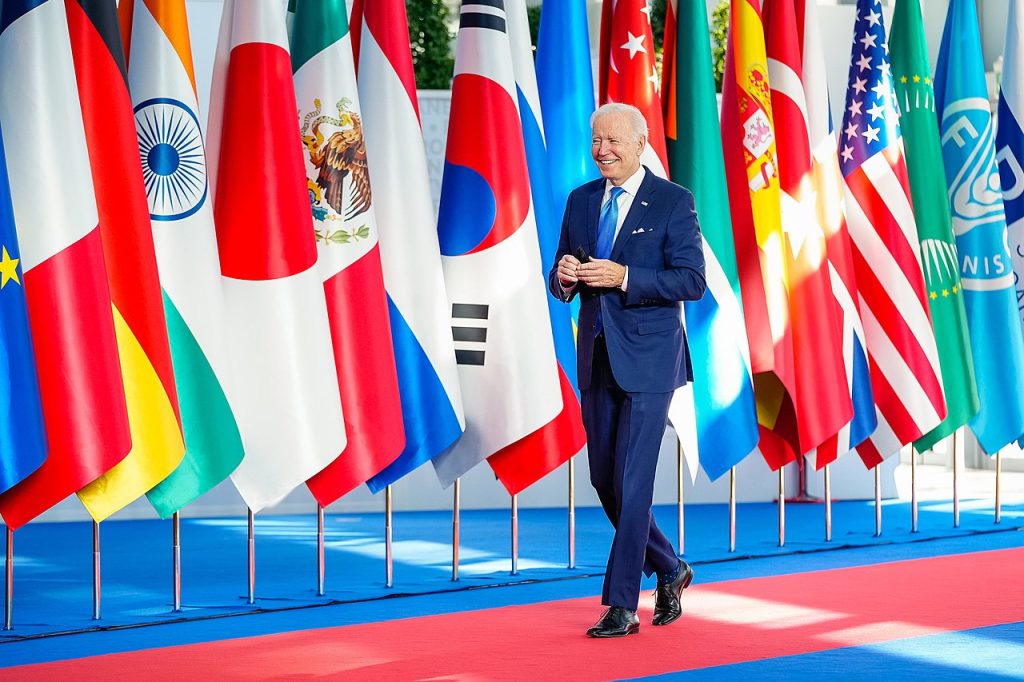Why the Summit for Democracy Could Become a Signal for Democratic Renewal
On December 9-10, the first Summit for Democracy will take place at the invitation of US President Joe Biden. The stated goal is to work with leaders from governments, civil society, and the private sector in 110 countries to find ways for democracies to confront increasing authoritarian pressure from within and abroad and meet the growing expectations that citizens around the world have for democratic governance. Is the summit a white flag to the rising tide of authoritarianism, or a much needed rally cry for democracy?
It is long overdue for democracies to face up to these challenges with self-confidence. For more than a decade, renowned monitoring tools have unanimously reported a gradual erosion of the quality of democracy worldwide. In the 137 countries examined in the Bertelsmann Stiftung’s Transformation Index since 2006, the downward trend continues. In the BTI 2022, which will be published at the beginning of next year, autocracies make up the majority for the first time. The status of political transformation and good governance will reach an all-time low for the sixth time in a row.
The drivers of these negative developments are, on the one hand, autocratic regimes that are taking increasingly repressive action against actual and potential critics and opposition figures, curtailing freedom of the press, freedom of speech and freedom of assembly, manipulating elections and undermining the remaining checks and balances on power. On the other hand, these trends are also occurring more and more frequently in democracies. Since 2010, the BTI has recorded the most significant losses in the quality of democracy, particularly in the most democratic regions of the world, namely East-Central and Southeast Europe and Latin America and the Caribbean. Even the established Western democracies not studied in the BTI are under increasing pressure. In 24 of the 41 OECD and EU countries studied by the Sustainable Governance Indicators, the experts observed democratic backsliding since 2012/2013.
The warning and wake-up calls of civil society actors, journalists, opposition politicians, and activists about the increasing restrictions on their activities and the slow but steady erosion of democratic institutions have been going on for years. The number of mass protests against both autocratic and democratic political elites peaked before the outbreak of the COVID-19 pandemic. They were directed primarily against rampant corruption, growing social injustice, and insufficient opportunities for political and economic participation.
Overcoming paralysis and complacency
In many democracies, some of them long-established and consolidated, populist, anti-democratic or nationalist governments have been elected to office, not least because of the failure of established political elites to respond to this discontent. In many places – from Brazil and Poland to India and the United States – these governments set about deliberately dismantling the very institutions and challenging the very norms that had hitherto been regarded as guarantors of freedom, prosperity, the protection of minorities and the restriction of arbitrary rule. Strategies on how established democracies, in particular, should deal with this kind of threat from within were often lacking. According to BTI data polarization in societies grew as much as the ability or willingness of political actors to manage these conflicts in a moderating and inclusive way and work towards social consensus diminished.
Democratic governance seemed to have less and less to counter the increasingly self-confident narrative of authoritarian states about the demise of democracy, the targeted disinformation campaigns from inside and outside actors, and the closing of ranks among anti-establishment parties and governments. All too often, the last line of defense was formed by representatives of civil society and the institutions under attack (judiciary, media, parliaments).
Nevertheless, there are first signs that the paralysis with which politicians in many countries have met the dismantling of the rule of law and democratic achievements is slowly dissolving: the European Union is taking a more assertive stance against violations of the rule of law by its two members Hungary and Poland, the Biden administration, as well as the new German government, are emphasizing not only reforms of democracy from within, but also the demand for a value-based foreign policy. International initiatives have been formed to work on very concrete proposals in areas such as protecting the integrity of elections or countering targeted disinformation campaigns.
Can a summit meeting, of all things, send out a strong signal for democratic renewal? Especially when the invitation comes from the government of a country whose democratic foundations have been shaken more violently than in almost any other state in the Western world, and whose hitherto so powerful radiance and sense of mission have been severely diminished as a result? There was no lack of criticism in the run-up to the event, some of it justified: of the list of invitations, last-minute preparation, or the insufficient involvement of civil society organizations – some commentators also raised the fundamental question of whether such a politically sensitive undertaking might not send the wrong signal altogether in a time of global testiness and increasingly assertive authoritarian powers.
Rarely can it be judged a priori whether a summit meeting will produce more than talk and declarations of intent. However, some points give reason to hope that the Summit for Democracy might end up being an impetus for change.
1. The guest list
It did not come as a surprise that some countries ended up on the list of invitees whose governments are currently hindering rather than promoting democratic reforms (e.g., Brazil, India or Poland). The US administration had already announced early that it would pursue a “big tent” approach. Nonetheless, fears that geostrategic considerations alone would determine participation have not materialized. Important autocratic US allies like Egypt are not in the mix. NATO member Turkey will also have no seat at the table. In total, only seven countries classified as autocracies in the BTI 2022 have been invited (Angola, DR Congo, Iraq, Kenya, Nigeria, Pakistan and Zambia).
The sharp reactions of some non-invited states indicate that there is apparently more at stake than symbolism. Hungary, the only EU member state not to have received an invitation, blocked a common EU contribution to the summit in the run-up. In a joint statement, the ambassadors of China and Russia accused the United States of “dividing the global community”; China is likely to have been particularly snubbed by Taiwan’s invitation. In its “White Paper on Democracy” published on the weekend before the summit, the Chinese government claims interpretive authority over what true democracy is.
The fact that this year’s meeting is planned as only the first of two events helps shift the focus away from the democratic credentials of the invited heads of government to the issues at hand. The announcement of a “year of action” and a second summit in 2022 also offers a possibility to monitor the implementation of announced reform steps and initiatives in the year ahead.
2. The role of the host
Undoubtedly, the summit is also intended to send a strong signal that the US is re-assuming its global leadership role in matters of democracy and human rights and is re-affirming its commitment to multilateral cooperation. On the one hand, the tarnished credibility on the international stage and the problems with its own democracy offer plenty of room for failure. At the same time, it might also offer the great opportunity, perhaps for the first time since the end of the East-West conflict, to truly change the perspective and attitude of Western democracies. Sensing the fragility of democratic achievements and the need for fundamental reforms in their own societies may help to break through traditional approaches in which the transfer of good examples always seemed to go in only one direction: from “old” established democracies to “young” democracies in transformation.
What Kalypso Nicolaidis und Richard Youngs are suggesting for the European Union could well apply beyond: numerous states whose democratic transformations have been supported by the West in recent decades have their own experiences to share on how to make democratic processes and institutions more resilient to authoritarianism from inside and outside. If the transfer of knowledge and democratic innovations could be made a two-way street, then the weakness of Western democracies could, in retrospect, prove to have been a starting point for genuine renewal – both for incremental domestic change as well as for the design of international and multilateral cooperation to strengthen democracy.
3. The topics
Whether the summit can indeed inspire such a shift in perspective and effect real change, in the long run, will be determined not least by choosing the topics, setting the tone and expectations for the outcome. It is a good sign that the combination of domestic political renewal and international solidarity is reflected in the formulation of the three main topics that have been outlined for the conference. “Defending against authoritarianism”, “addressing and fighting corruption”, as well as “promoting respect for human rights” potentially combine both – an inward as well as an outward look. The importance of setting this bracket and equally focusing on the introspective view cannot be overestimated. It helps avoid an overarching focus on the competition between autocratic and democratic systems (which is also at stake) and would unnecessarily feed the accusation raised by China and Russia that the summit will contribute to a division of the international community. Emphasizing that democratic renewal is, fore and foremost, a national domestic effort will also help alleviate pressure from those democratic countries that cannot or do not want to end up being forced to take a strong stand between two poles.
It will have to be seen how concrete the commitments called for by the participating countries ultimately are. For governments that are serious about their reform agendas, the Summit for Democracy (not: of democracies) offers both the opportunity to forge alliances with like-minded countries and demonstrate to citizens at home that words are followed by actions. The proclaimed “year of action” would offer sufficient time and space for broad and open discourse and to make the efforts of implementing real change transparent. The issue of fighting corruption has a particularly strong appeal, both for the US and for most other countries at the conference table. Hardly any other issue is as unanimously called for by citizens worldwide; the failure of delivering tangible results is at the same time one of the main reasons for frustration with political elites. Effective punishment of abuse of office and effective anti-corruption policies are consistently among the lowest-rated indicators in the BTI. The country reports illustrate that while there has been some progress in formally establishing institutions to fight corruption, the “hot potatoes” such as enforcing transparent party and campaign financing rules or public procurement are only inadequately addressed by most governments.
Despite all existing shortcomings of democratic governments in the fight against corruption, nationally or on a global scale, the comparison with autocratic regimes offers one of the most vivid proofs of how large the performance gap is: among the 23 countries that are considered to have functioning anti-corruption policies in place according to BTI 2022 data, are only two autocracies: Singapore and the United Arab Emirates.
One should not overestimate the tangible changes and concrete policy results that a summit can achieve. But underestimating its symbolic impact and the momentum it could create would be equally naïve.

